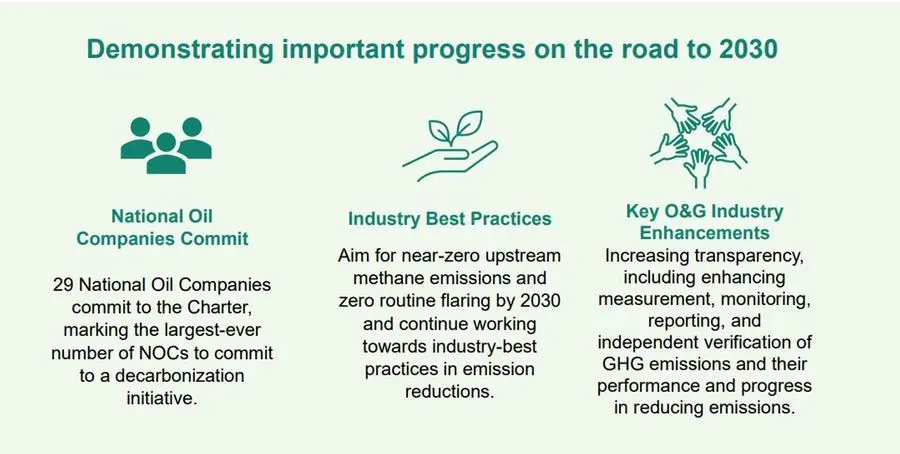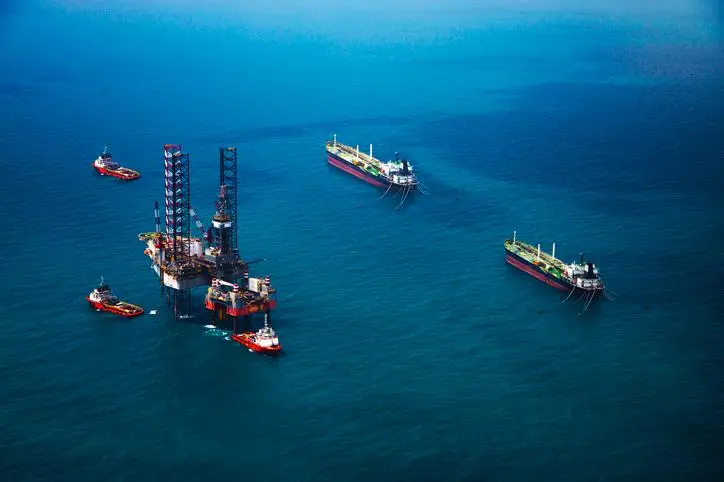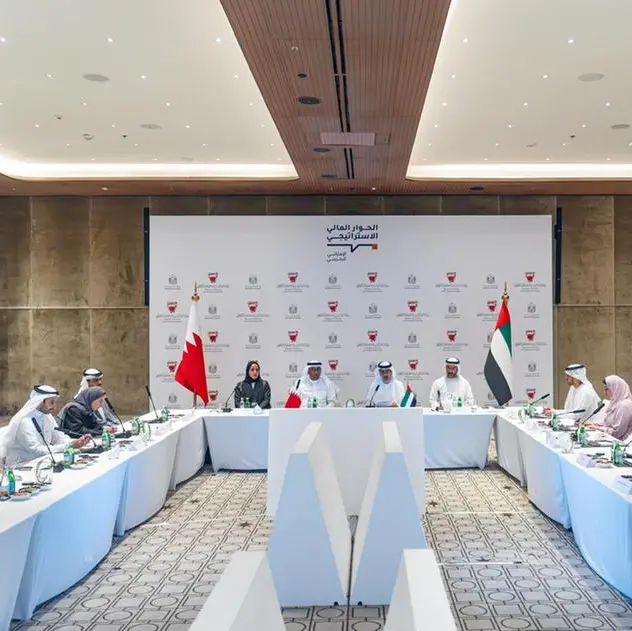PHOTO
- The COP28 Presidency and the Kingdom of Saudi Arabia today announced 50 oil and gas companies have joined the Oil and Gas Decarbonization Charter, a global industry Charter dedicated to high-scale impact, and to speed up climate action within the industry.
- The Charter formalizes COP28 President Dr. Sultan Al Jaber’s calls for the industry to align around net zero by or before 2050, zero-out methane emissions, eliminate routine flaring by 2030 and to continue working towards industry best practices in emission reduction.
- Launching the OGDC at COP28, Dr. Al Jaber emphasized: “The launch of the OGDC is a great first step — and whilst many national oil companies have adopted net zero 2050 targets for the first time, I know that they and others, can and need to do more. We need the entire industry to keep 1.5C within reach and set even stronger ambitions for decarbonization.”
- Signatory companies represent over 40 percent of global oil production, with National Oil Companies representing over 60 percent of signatories – the largest-ever number of NOCs to commit to a decarbonization initiative.
Dubai: The COP28 Presidency and the Kingdom of Saudi Arabia today launched the landmark Oil and Gas Decarbonization Charter (OGDC), a global industry Charter dedicated to speeding up climate action and achieving high-scale impact across the oil and gas sectors.
To date, 50 companies, representing more than 40 percent of global oil production have signed on to the OGDC, with National Oil Companies representing over 60 percent of signatories – the largest-ever number of NOCs to commit to a decarbonization initiative.
COP28 President Dr. Sultan Al Jaber said, “The launch of the OGDC is a great first step — and whilst many national oil companies have adopted net-zero 2050 targets for the first time, I know that they and others, can and need to do more. We need the entire industry to keep 1.5C within reach and set even stronger ambitions for decarbonization.”
Signatories have committed to net-zero operations by 2050 at the latest, and ending routine flaring by 2030, and near-zero upstream methane emissions. They agree to continue to work towards industry best practices in emission reductions and a number of key actions, including:
- Investing in the energy system of the future including renewables, low-carbon fuels and negative emissions technologies.
- Increasing transparency, including enhancing measurement, monitoring, reporting and independent verification of greenhouse gas emissions and their performance and progress in reducing emissions.
- Increasing alignment with broader industry best practices to accelerate decarbonization of operations and aspire to implement current best practices by 2030 to collectively reduce emission intensity.
- Reducing energy poverty and providing secure and affordable energy to support the development of all economies.
Dr. Al Jaber said of the Charter, “I am committed to both inclusivity and transparency. If we want to accelerate progress across the climate agenda, we must bring everyone in to be accountable and responsible for climate action. We must all focus on reducing emissions and apply a positive can-do vision to drive climate action and get everyone to take action. We need a clear action plan, and I am determined to deliver one.”
The OGDC recognizes that climate change is “a collective challenge that requires strong and focused action from producers and consumers of energy, fundamental changes across society and the energy sector, as well as international collaboration, to advance the energy transition and reduce greenhouse gas emissions from oil and gas.”
Beyond decarbonization, signatories recognize it is essential for the oil and gas industry to increase actions, including engaging with customers, investing in the energy system of the future, and increasing transparency in measurement, reporting and independent verification.
The OGDC is a key initiative under the Global Decarbonization Accelerator (GDA), which was launched at the World Climate Action Summit today. The GDA is focused on three key pillars: rapidly scaling the energy system of tomorrow; decarbonizing the energy system of today; and targeting methane and other non-CO2 greenhouse gases. It is a comprehensive plan for system-wide change, addressing the demand and the supply of energy at the same time. The GDA has been informed by the thinking of key stakeholders, including international organisations, governments and policy makers, NGOs, and CEOs from every industrial sector.


Signatories to Oil and Gas Decarbonization Charter
NOCs: ADNOC, Bapco Energies, Ecopetrol, EGAS, Equinor, GOGC, INPEX Corporation, KazMunaiGas, Mari Petroleum, Namcor, National Oil Company of Libya, Nilepet, NNPC, OGDC, OMV, ONGC, Pakistan Petroleum Limited (PPL), Pertamina, Petoro, Petrobras, Petroleum Development Oman, Petronas, PTTEP, Saudi Aramco, SNOC, SOCAR, Sonangol, Uzbekneftegaz, ZhenHua Oil, YPF.
IOCs: Azule Energy, BP, Cepsa, COSMO Energy, Crescent Petroleum, Dolphin Energy Limited, Energean Oil & Gas, Eni, EQT Corporation, Exxonmobil, ITOCHU, LUKOIL, Mitsui & Co, Oando plc, Occidental Petroleum, Puma Energy (Trafigura), Repsol, Shell, TotalEnergies, Woodside Energy Group
About COP28 UAE:
- COP28 UAE is taking place at Expo City Dubai from November 30-December 12, 2023. The Conference is expected to convene over 70,000 participants, including heads of state, government officials, international industry leaders, private sector representatives, academics, experts, youth, and non-state actors.
- As mandated by the Paris Climate Agreement, COP28 UAE is delivering the first ever Global Stocktake – a comprehensive evaluation of progress against climate goals.
- The UAE is leading a process for all parties to agree upon a clear roadmap to accelerate progress through a pragmatic global energy transition and a “leave no one behind” approach to inclusive climate action.




















